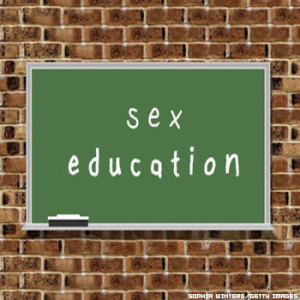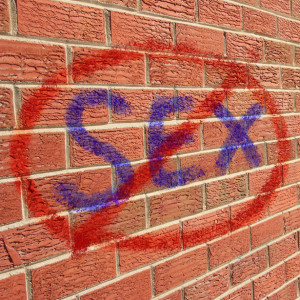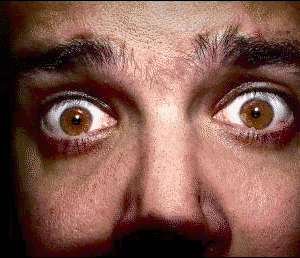Ontario Sex Ed Update!
 Ontario, Canada’s new sex ed curriculum, which we reported back in February would include issues of consent, premiered two weeks ago. The Windsor Star reported on March 8th that a poll released by Forum Research showed a 49 percent approval rate for the new curriculum, with 34 percent of Ontarians disapporving, and 17 percent having no opinion. For those who disapprove, their opinions seem to come from cultural, political, and/or religious views framing sexuality issues as inappropriate for children. The article quotes one parent of a six-year-old son, Ally Carter, as saying, “We don’t shelter our kids. But we teach them and show them based on our values, not the government’s.” Carter said she plans to transfer her children to a private Christian school because, although all schools in Ontario will be teaching the new curriculum, she would feel more comfortable with her children being taught about sexuality in that setting.
Ontario, Canada’s new sex ed curriculum, which we reported back in February would include issues of consent, premiered two weeks ago. The Windsor Star reported on March 8th that a poll released by Forum Research showed a 49 percent approval rate for the new curriculum, with 34 percent of Ontarians disapporving, and 17 percent having no opinion. For those who disapprove, their opinions seem to come from cultural, political, and/or religious views framing sexuality issues as inappropriate for children. The article quotes one parent of a six-year-old son, Ally Carter, as saying, “We don’t shelter our kids. But we teach them and show them based on our values, not the government’s.” Carter said she plans to transfer her children to a private Christian school because, although all schools in Ontario will be teaching the new curriculum, she would feel more comfortable with her children being taught about sexuality in that setting.
The connection between cultural conservatism and sex ed backlash was made in a March 9th New York Times article speaking about sex ed in a globalized world. Article author Jonathan Zimmerman, author of Too Hot to Handle: A Global History of Sex Education, explained, “Sex educators say that young people are sexual actors, no matter their culture, so schools should help them ‘make choices’ about their bodies. But millions of people see their culture as a bulwark against sex among youth, who should have no choice in the matter.” So although parents like Ally Carter might not “shelter” their children, and understand that their children receive many messages about sex at young ages from the media and their peers, they still see sex as a non-issue for their children in that never the twain shall meet. See the New York Time’s article for Zimmerman’s abridged breakdown of a globalized world’s problem with sex ed.
The Sex/Sex Ed Double-Standard
 A March 4th Atlantic.com article by Amber Madison pointed out the Sex/Sex Ed double standard illustrated, in part, by the backlash to comprehensive sexuality education discussed above. Madison wrote about the censorship that sites like Bedsider.org and other online sex ed resources face when promoting education online because social media platforms such as Twitter and Facebook often deem sex ed to contain sexual content or language that was judged as “profane, vulgar, threatening or generates high negative feedback.” At the same time, the sexually-explicit content provider, Playboy Magazine, is still able to promote tweets of bare breasts, “belfies” (or butt-shwoing selfies), and “suggestive text that is decidedly not health-oriented.”
A March 4th Atlantic.com article by Amber Madison pointed out the Sex/Sex Ed double standard illustrated, in part, by the backlash to comprehensive sexuality education discussed above. Madison wrote about the censorship that sites like Bedsider.org and other online sex ed resources face when promoting education online because social media platforms such as Twitter and Facebook often deem sex ed to contain sexual content or language that was judged as “profane, vulgar, threatening or generates high negative feedback.” At the same time, the sexually-explicit content provider, Playboy Magazine, is still able to promote tweets of bare breasts, “belfies” (or butt-shwoing selfies), and “suggestive text that is decidedly not health-oriented.”
Wrote Madison, “This double standard is simply a microcosm for how sex and sexuality are dealt with in our larger culture, according to [Susan Gilbert, co-director of The National Coalition for Sexual Health]. ‘We live in a hypersexual world.’ she says. ‘Sexual images and content are literally everywhere, from suggestive advertisements and erotic romance novels to provocative TV series to sex-tip columns in magazines and on the Internet.'” Familiarly to many sex educators, it is just the conversation *about* sexuality that tries to help people understand the messages they receive from the media, family and friends, religion, and other sources that gets censored.
This is particularly problematic because a 2011 study from YTH (Youth+Tech+Health) showed that 89 percent of adolescents say they learn about sexual health issues online. Zimmerman, in the New York Times article discussed above cites online sex ed resources such as Sexetc.org and text-chat services like Planned Parenthood’s ICYC (In Case You’re Curious) as some of the “most promising intervetions” for teens because they allow teens to be sexual actors without adult scrutiny. And Madison wrote that even organizations like the CDC have turned to social media to promote sexual health “to engage with populations that are especially vulnerable to sexual risk,” (that quote from CDC health-communications specialist, Rachel Kachur). Hopefully the goal of YTH founder, Deb Levine, to have social media and networking site executives meet with sexual health professionals in order to amend policies, can be reached.
Missouri Sex Ed Additions
![By Nickbigd (Own work) [GFDL (http://www.gnu.org/copyleft/fdl.html), CC-BY-SA-3.0 (http://creativecommons.org/licenses/by-sa/3.0/) or CC BY 2.5 (http://creativecommons.org/licenses/by/2.5)], via Wikimedia Commons](http://www.sexedcenter.org/wp-content/uploads/2015/03/Mocapitolnorthview-220x300.jpg)
By Nickbigd (Own work) [GFDL (http://www.gnu.org/copyleft/fdl.html), CC-BY-SA-3.0 (http://creativecommons.org/licenses/by-sa/3.0/) or CC BY 2.5 (http://creativecommons.org/licenses/by/2.5)], via Wikimedia Commons
If the explicit message of sex ed is about protecting children, opposition seems to fade. Headed by Representative Genise Montecillo (D-St. Louis), Missouri legislators are considering adding information about sexual predators, online predators, and inappropriate text messaging to their state’s sexuality education. OzarkFirst.com reported that House Bill 501 is supported by both the Missouri Catholic Conference and the Missouri National Education Association, and would “require they be taught about behaving responsibly and remaining safe online and how to communicate with adults about inappropriate situations and abuse”. No one spoke in opposition to the bill at a recent house hearing where it was presented.







